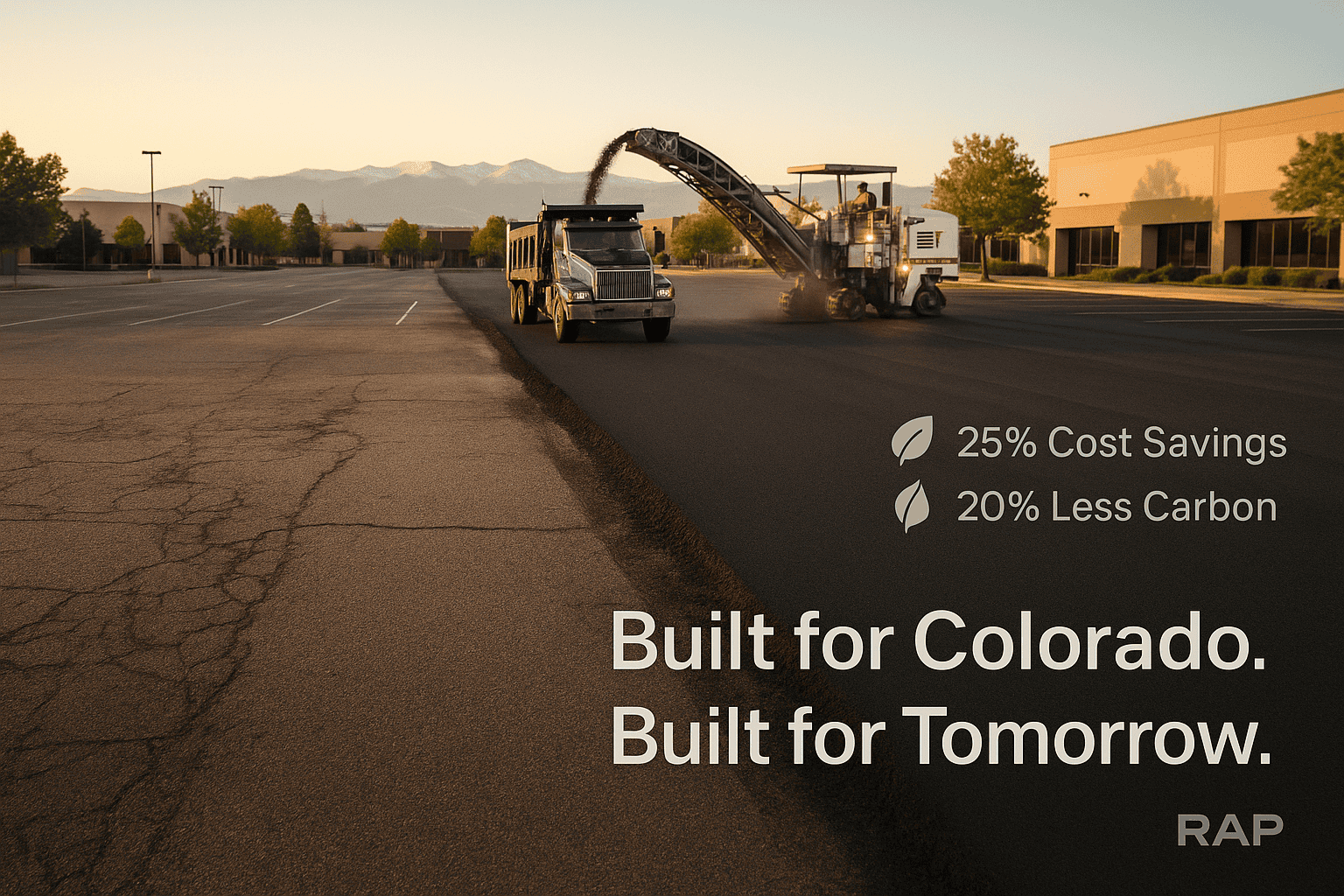Asphalt patching vs. full-depth repair in Denver is a critical decision for property managers aiming to maintain safe and durable pavements. Denver’s unique climate, marked by frequent freeze-thaw cycles, accelerates pavement damage, leading to issues like potholes and alligator cracks.
According to the Colorado Department of Transportation, these cycles contribute significantly to pothole formation, especially in spring when temperatures fluctuate rapidly. We at Asphalt Coatings Company specialize in both patching and full-depth repairs, offering solutions tailored to Denver’s challenging conditions.
This guide explores the differences between these methods, helping you choose the best approach for cost, durability, and compliance.
Why Repairs Matter in Colorado’s Freeze-Thaw Climate
Denver’s climate poses unique challenges for asphalt pavements. Frequent freeze-thaw cycles cause water to expand and contract within asphalt, creating cracks and potholes. The Colorado Department of Transportation notes that these cycles are particularly damaging in spring, when daily temperature swings are common, leading to pavement deterioration. Denver’s high altitude also exposes pavements to intense ultraviolet (UV) radiation, which degrades asphalt binders over time. According to the Colorado Department of Transportation, heavy traffic loads in metro Denver areas like LoDo and the Denver Tech Center stress pavements, necessitating timely maintenance and repairs to prevent costly replacements.
Traffic Load, UV, and Altitude Factors
High traffic volumes in areas like Cherry Creek or near Coors Field accelerate pavement wear. Heavy vehicles cause fatigue cracking, while UV radiation at Denver’s 5,280-foot elevation breaks down asphalt’s binding agents, reducing its flexibility. These factors, combined with freeze-thaw cycles, demand proactive maintenance to extend pavement life.
Common Distresses: Potholes, Alligator Cracks
Potholes form when water seeps into pavement cracks, freezes, and expands, weakening the surface. Alligator cracks, resembling a reptile’s skin, indicate deeper structural issues, often due to repeated freeze-thaw stress or subbase failure. Addressing these distresses promptly prevents safety hazards and costly repairs.
Quick Glossary: Patching & Full-Depth Terms
Understanding key terms helps property managers make informed decisions:
- Asphalt Patching: Repairs surface-level damage by removing and replacing the top asphalt layer, ideal for minor cracks or potholes.
- Full-Depth Repair: Reconstructs the entire pavement section, including base layers, to address structural failures like alligator cracking.
- Freeze-Thaw Cycle: Temperature fluctuations above and below 32°F, causing water in asphalt to expand and contract, leading to damage.
- Alligator Cracking: Interconnected cracks indicating fatigue failure, often requiring full-depth repair.
Comparative Overview
Choosing between asphalt patching and full-depth repair depends on damage severity, budget, and downtime constraints. Below, we break down each method and provide a decision matrix.
What Is Surface Patching?
Asphalt patching targets shallow damage, typically less than 2 inches deep. Crews remove loose debris, apply a tack coat, and fill the area with hot mix asphalt, compacting it to restore a smooth surface. According to the City of Denver’s asphalt pavement specifications, patching requires a minimum 2-foot-wide area adjacent to new walks or ramps, ensuring compliance with local standards. Patching is quick, cost-effective, and minimizes disruption, making it ideal for small potholes or surface cracks.
What Is Full-Depth Repair?
Full-depth repair addresses structural issues by removing the entire pavement section, including the base and subbase, and rebuilding it. The Colorado Department of Transportation’s Section 403 specifies excavating to neat lines, coating edges with emulsified asphalt, and placing hot mix asphalt in layers up to 3 inches thick. This method is suited for widespread alligator cracking or subbase failures, offering long-term durability but requiring more time and investment.
Decision Matrix: Damage Extent, Budget, Timeline
| Factor | Patching | Full-Depth Repair |
| Damage Depth | Under 2 inches | Over 2 inches or structural issues |
| Cost | $2–$5 per sq.ft. | $4–$12 per sq.ft. |
| Downtime | Hours to 1 day | 2–4 days |
| Longevity | 2–5 years | 10–20 years |
| Best For | Minor cracks, small potholes | Alligator cracks, subbase failure |
Book Your Free Denver Pavement Assessment with Asphalt Coatings Company to determine the best repair method for your property.
Cost Breakdown & ROI
Understanding costs and return on investment (ROI) is crucial for budgeting repairs. Costs vary based on repair scope, materials, and labor.
Short-Term vs Lifetime Cost per SF
Asphalt patching typically costs $2–$5 per square foot, while full-depth repair ranges from $4–$12 per square foot, according to HomeGuide. Patching offers short-term savings but may require frequent maintenance, especially in Denver’s harsh climate. Full-depth repair, while more expensive upfront, provides a longer lifespan (10–20 years), reducing lifetime costs per square foot. For example, a 1,000 sq.ft. parking lot patched at $3 per sq.ft. costs $3,000, while full-depth repair at $8 per sq.ft. costs $8,000 but lasts four times longer.
Downtime and Tenant Impact Scenarios
Patching requires minimal downtime, often completed in hours, making it ideal for busy commercial properties near Denver’s Union Station. Full-depth repair may close sections for 2–4 days, impacting tenant access. We minimize disruptions by scheduling repairs during off-peak hours, ensuring tenant satisfaction.
Schedule a Free Estimate with Asphalt Coatings Company to balance cost and convenience for your property.
Step-by-Step Process Walk-Through
Both repair methods follow a structured process to ensure quality and compliance.
Inspection & Core Sampling
We begin with a thorough inspection, assessing damage depth and extent. Core sampling identifies subbase issues, guiding the choice between patching and full-depth repair. Our team uses advanced tools to ensure accurate diagnostics.
Saw-cut, Milling, and Excavation
For patching, crews saw-cut the damaged area to create clean edges. For full-depth repairs, milling removes the entire pavement section. Excavation ensures a stable subbase, per CDOT specifications.
Compaction & Quality Testing
Hot mix asphalt is applied in layers and compacted to 92–96% density, as required by CDOT. Quality testing, including density checks, ensures durability. We provide written test results within 48 hours, per City of Denver standards.
Compliance & Risk
Compliance with local regulations is critical to avoid legal and safety issues.
ADA Slope and Trip-Hazard Liability
Potholes and uneven surfaces pose trip hazards, potentially leading to civil penalties up to $75,000 under 28 CFR §36.504. We ensure repairs meet ADA slope requirements, protecting property managers from liability.
CDOT & City of Denver Spec Alignment
Our repairs align with City of Denver and CDOT standards, including minimum patching sizes and material specifications, ensuring compliance and durability.
Local Climate Tips
Denver’s climate requires proactive pavement care to combat environmental stressors.
Winter Staging & De-icing Protection
Schedule repairs before winter to avoid freeze-thaw damage. According to S&G Asphalt Services, using non-corrosive de-icers like calcium magnesium acetate can protect asphalt, as traditional salt can cause pitting and accelerate deterioration.
Summer UV Oxidation Counter-Measures
Apply sealcoating every 2–3 years to shield asphalt from UV radiation. Regular crack sealing prevents water infiltration, extending pavement life.
Maintenance After Repair
Proper maintenance ensures long-term pavement performance.
Sealcoating, Crack Sealing Schedule
- Sealcoating: Apply every 2–3 years to protect against UV and water damage, costing $0.15–$0.25 per sq.ft.
- Crack Sealing: Fill cracks annually to prevent water infiltration, costing $1–$3 per linear foot.
Annual Inspection Checklist
- Check for new cracks or potholes.
- Assess drainage to prevent water pooling.
- Verify ADA compliance for slopes and ramps.
- Schedule professional inspections with Asphalt Coatings Company.
Case Studies by Asphalt Coatings Company
Our 38 years of experience in Denver demonstrate our expertise.
Aurora Retail Center Full-Depth Success
A retail center near Aurora Town Center suffered from alligator cracking due to subbase failure. We performed a full-depth repair, excavating and rebuilding the 5,000 sq.ft. lot, restoring safety and compliance within three days.
Westminster Parking-Lot Patch Program
A Westminster office complex required rapid pothole repairs to minimize tenant disruption. Our team patched 2,000 sq.ft. in one day, using hot mix asphalt, ensuring a seamless finish and quick reopening.
FAQs: Choosing the Right Repair
Q: How long does an asphalt patch last in Denver?
A: Typically 2–5 years, depending on traffic and freeze-thaw cycles.
Q: Will full-depth repair disrupt business longer?
A: Yes, expect 2–4 days of closure versus a few hours for small patches.
Q: Is full-depth always more expensive?
A: Upfront costs are higher, but lifecycle costs are often lower over 20 years.
Get Expert Asphalt Repair in Denver Today
Asphalt Coatings Company delivers precision asphalt repairs tailored to Denver’s unique climate. With over 38 years of experience, we ensure compliance, durability, and minimal disruption. Contact us for a free pavement assessment and start protecting your property today.


